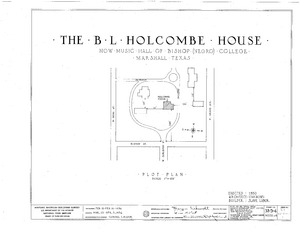Bishop College facts for kids
| Type | HBCU |
|---|---|
| Active | 1881–1988 |
| Location |
,
,
32°40′41″N 96°45′19″W / 32.6781°N 96.7552°W |
| Mascot | Tiger |
Bishop College was a special school for African American students. It was founded in 1881 in Marshall, Texas, by a group called the Baptist Home Mission Society. This college was created to help students in East Texas, where many Black people lived at that time. Later, in 1961, the college moved to Dallas, Texas. Bishop College closed its doors in 1988.
In 2006, another college, Georgetown College in Georgetown, Kentucky, offered a unique idea to former Bishop College students. They suggested that Bishop College alumni could "adopt" Georgetown College as their new school. Georgetown College even offered scholarships to the children and grandchildren of Bishop College alumni. These students could even get a diploma that said "Bishop College" on it! This plan aimed to help more minority students attend Georgetown.
Contents
The Story of Bishop College
Bishop College was started in 1881. It was founded by the Baptist Home Mission Society. They wanted to build a college for African American Baptists. A man named Nathan Bishop helped start this effort. He had been a school leader in New England.
Nathan Bishop promised $25,000 to begin the college. This promise was made during a meeting in Philadelphia, Pennsylvania. A group of Baptist ministers from East Texas chose the location. They picked a spot in Marshall, Texas, on land that used to be part of the Holcomb Plantation. This area was called Wyalucing.
Early Years and Leadership
For many years, most of Bishop College's teachers and leaders were European Americans. The first African American president was Joseph J. Rhoads. He started in 1929 and led the college through tough times. These included the Great Depression and World War II.
During his time, Bishop College stopped offering high school classes. These classes had helped students catch up on their education. President Rhoads focused on a new two-year program for ministers.
Moving to Dallas
In the 1930s and 1940s, the ministerial program grew. It was named the Lacy Kirk Williams Institute. When the college moved to Dallas in 1961, this program moved too. The institute became a special week-long seminar. Famous preachers like Jesse Jackson and Martin Luther King, Sr. attended it in 1975.
In 1961, Bishop College received money from the Hoblitzelle Foundation. This helped the college move to a large, 360-acre campus in Dallas. The new location helped the college attract more students. By 1970, almost 2,000 students were attending Bishop College.
College Closure
Bishop College closed in 1988. The college faced financial problems. Because of these issues, it lost its official recognition as a college. This also meant it could no longer receive money from groups like the United Negro College Fund.
In 1990, the campus was bought by Comer S. Cottrell. Today, another school called Paul Quinn College uses the old Bishop College campus.
A New Connection with Georgetown College
In 2006, Georgetown College in Kentucky offered a special program. They invited Bishop College alumni to make Georgetown their new "alma mater" (the school they graduated from). Georgetown College now offers scholarships to children or grandchildren of Bishop alumni. Students nominated by Bishop alumni can also get these scholarships.
When these students graduate, their diplomas will show the name and symbol of Bishop College. The president of Georgetown College hopes this program will help more minority students attend their school.
Famous People Who Attended Bishop College
Many talented people attended Bishop College. Here are some of them:
| Name | Class year | Notability | |
|---|---|---|---|
| David Abner Jr. | The first African American to graduate from a college in Texas. He also led Guadalupe College and Conroe College. | ||
| Rev. Dr. R. H. Boyd | He founded and led the National Baptist Publishing Board. | ||
| Ella J. Bradley-Hughley | 1907 | A choir director and singer who was popular in Los Angeles in the early 1900s. | |
| Bobby Brooks | An NFL player for the New York Giants. | ||
| William Harris | 1987 | An NFL player for teams like the St. Louis Cardinals and Green Bay Packers. | |
| Mae C. King | 1960 | A notable political scientist. She was the first African American and first woman on staff at the American Political Science Association. | |
| Tony Martin | An NFL player for the Miami Dolphins and San Diego Chargers. | ||
| Tony McGee | 1971 | An NFL defensive end for the Chicago Bears, New England Patriots, and Washington Football Team. | |
| William Nickerson, Jr. | He founded the Golden State Mutual Life Insurance Company, which was once the largest Black-owned business in the West. | ||
| Ike Thomas | 1970 | An NFL player for the Dallas Cowboys, Green Bay Packers, and Buffalo Bills. | |
| Emmitt Thomas | 1966 | A member of the NFL Pro Football Hall of Fame. | |
| Michael S. Williams | 1976 | A pastor at St. James Missionary Baptist Church in San Francisco, CA. He was also a board member for the National Baptist Convention U.S.A., Inc. |


